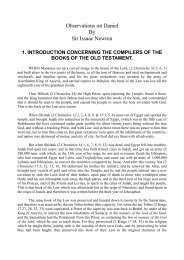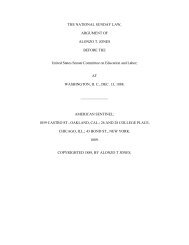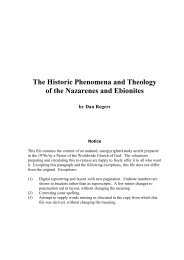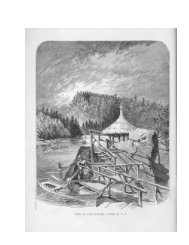THE EARLY CHRISTIAN SABBATH - Friends of the Sabbath Australia
THE EARLY CHRISTIAN SABBATH - Friends of the Sabbath Australia
THE EARLY CHRISTIAN SABBATH - Friends of the Sabbath Australia
You also want an ePaper? Increase the reach of your titles
YUMPU automatically turns print PDFs into web optimized ePapers that Google loves.
The Early Christian <strong>Sabbath</strong><br />
this case, however, we find human laws suppressing that which God has expressly<br />
commanded, <strong>the</strong> keeping <strong>of</strong> <strong>the</strong> seventh-day <strong>Sabbath</strong>. We find men putting in its place a<br />
day for which God has made no provision whatever at any<br />
Time. Namely, <strong>the</strong> day <strong>of</strong> <strong>the</strong> sun. Surely here we have a mark, an evidence, <strong>of</strong> <strong>the</strong> desire<br />
<strong>of</strong> willful men to set up <strong>the</strong>ir own wishes against <strong>the</strong> wishes <strong>of</strong> God, and to establish <strong>the</strong>ir<br />
own traditions instead <strong>of</strong> <strong>the</strong> things which God has commanded.<br />
The Sunday stands <strong>the</strong>refore in a most unfortunate situation, and <strong>the</strong> <strong>Sabbath</strong>,<br />
although it has for centuries been flouted, still remains <strong>the</strong> rest day <strong>of</strong> God, <strong>the</strong> day <strong>of</strong><br />
which Christ Himself is Lord and Master.<br />
12. Sunday Supported by Superstition<br />
WE do not know what were <strong>the</strong> feelings <strong>of</strong> <strong>the</strong> common people <strong>of</strong> <strong>the</strong> early<br />
centuries <strong>of</strong> <strong>the</strong> Christian Era concerning <strong>the</strong> observance <strong>of</strong> Sunday. The constant<br />
repetition, for hundreds <strong>of</strong> years, <strong>of</strong> Sunday blue laws indicates that it was accepted<br />
reluctantly.<br />
This entirely human institution, forced upon <strong>the</strong> people by ecclesiastical and civil<br />
authorities, evidently met with resistance, probably stubborn in many places. However,<br />
<strong>the</strong> pressure <strong>of</strong> laws by church and state governing <strong>the</strong> keeping <strong>of</strong> Sunday had effect. The<br />
substitution <strong>of</strong> <strong>the</strong> Sunday for <strong>the</strong> <strong>Sabbath</strong> was, in <strong>the</strong> main, accomplished by <strong>the</strong> tenth<br />
century after Christ.<br />
In <strong>the</strong> West, where Rome wielded its most direct influence, <strong>the</strong> <strong>Sabbath</strong> was more<br />
readily disregarded than in <strong>the</strong> East. On <strong>the</strong> o<strong>the</strong>r hand, <strong>the</strong> ritual <strong>of</strong> <strong>the</strong> Creek Orthodox<br />
Church shows that throughout <strong>the</strong> medieval centuries worship on <strong>the</strong> <strong>Sabbath</strong> was<br />
provided in <strong>the</strong> churches.<br />
Since <strong>the</strong> blue laws proved difficult to enforce, ano<strong>the</strong>r method <strong>of</strong> Sunday<br />
emphasis was developed. Superstition was brought to its aid. We know <strong>of</strong> this through<br />
stories <strong>of</strong> people supposedly crippled for desecrating Sunday. An eager chronicler <strong>of</strong> this<br />
sort <strong>of</strong> thing was a man named Gregory, a sixth-century bishop <strong>of</strong> <strong>the</strong> city <strong>of</strong> Tours in<br />
France.<br />
Two hundred years before Gregory's day, <strong>the</strong> bishop <strong>of</strong> Tours had been a man by<br />
<strong>the</strong> name <strong>of</strong> Martin, important in <strong>the</strong> history <strong>of</strong> early Christianity. Because Martin was so<br />
highly regarded he became a patron saint <strong>of</strong> France, <strong>the</strong> church over which he presided,<br />
and where he was buried, became a shrine, patronized by those who believed in<br />
intercession <strong>of</strong> <strong>the</strong> spirits <strong>of</strong> dead saints. To Tours came people from all over France to<br />
worship and pray, to seek protection from <strong>the</strong>ir enemies, and to be healed <strong>of</strong> <strong>the</strong>ir<br />
infirmities.<br />
Gregory <strong>of</strong> Tours felt highly honored in being made bishop <strong>of</strong> a church once<br />
presided over by so great a churchman and saint as Martin, and went to great lengths to<br />
show St. Martin's power in caring for those who sought his aid. In presenting <strong>the</strong> record,<br />
Bishop Gregory describes, among o<strong>the</strong>r cases, <strong>the</strong> healing <strong>of</strong> people who, he would have<br />
us believe, were crippled for working on Sunday, and <strong>the</strong>n, we are told, successfully<br />
solicited St. Martin for healing. Here are a few cases from Gregory's writings.<br />
42

















